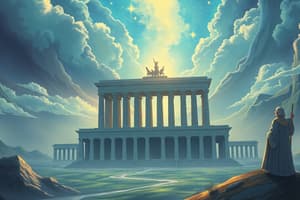Podcast
Questions and Answers
What is the form of democracy where citizens vote firsthand?
What is the form of democracy where citizens vote firsthand?
- Popular Sovereignty
- Representative Democracy
- Direct Democracy (correct)
- Authoritarian
Which economic system involves colonies existing to make a favorable balance of trade for the mother country?
Which economic system involves colonies existing to make a favorable balance of trade for the mother country?
- Triangular Trade
- Mercantilism (correct)
- Boycott
- Social Contract
What is a group of people that make laws called?
What is a group of people that make laws called?
- Puritans
- Indentured Servants
- Legislature (correct)
- Constitution
What is the notion that power lies with the people?
What is the notion that power lies with the people?
What is the action of revoking or annulling a law or congressional act?
What is the action of revoking or annulling a law or congressional act?
What was the Great Compromise?
What was the Great Compromise?
What is the Three-Fifths Compromise?
What is the Three-Fifths Compromise?
What is the Electoral College?
What is the Electoral College?
What is Federalism?
What is Federalism?
Who were the Anti-Federalists?
Who were the Anti-Federalists?
Flashcards are hidden until you start studying
Study Notes
- Representative Democracy: A form of government where citizens elect representatives to make decisions on their behalf.
- Common Law: Legal system based on precedent and customs.
- Popular Sovereignty: Notion that power lies with the people.
- Democracy: Form of government where citizens hold the power to rule.
- Direct Democracy: Voting system where citizens make decisions directly.
- Authoritarian: Government led by a single leader or group with absolute power.
- Legislature: Group of people making laws.
- Social Contract: Agreement between government and people for obedience to laws.
- Puritans: 16th-century Protestant group demanding simplified doctrine.
- Indentured Servants: People agreeing to work in exchange for passage to the New World.
- Triangular Trade: Trade pattern between America, Africa, and Europe during colonial times.
- Mercantilism: Economic system focusing on favorable balance of trade.
- Boycott: Refraining from buying or using products as a form of protest.
- Repeal: Act of revoking or annulling a law or congressional act.
- Constitution: Document outlining the US system of government with 7 articles and 27 amendments.
- Bicameral: Legislature consisting of two parts, Senate and House of Representatives.
- Ratify: Give formal consent to something, like the Constitution.
- Great Compromise: Introduced by Roger Sherman, created a bicameral Congress.
- Three-Fifths Compromise: Every 5 slaves counted as 3 whites in a state's population.
- Electoral College: Body of people casting votes for the President.
- Federalism: Breaking the government into Federal and State levels.
- Federalists: Supporters of the Constitution.
- Citizen: Community member with loyalty to the government and entitled to protection.
- Naturalization: Legal process for obtaining citizenship.
- Alien: Non-citizen.
- Immigrant: Person moving permanently to a new country.
- Deport: Sending an alien or immigrant back to their country.
- Government: Governing body of a nation, state, or community.
- Republic: Representative government, famously known from the Roman Senate.
- Monarchy: Government led by a single person, usually by birthright.
- Totalitarian: System controlling almost every aspect of people's lives.
- Precedent: Ruling used as a basis for a judicial decision.
- Natural Rights: Freedoms relating to life, liberty, and property.
- Anti-Federalists: People who opposed the ratification of the Constitution until a Bill of Rights was added.
Studying That Suits You
Use AI to generate personalized quizzes and flashcards to suit your learning preferences.




